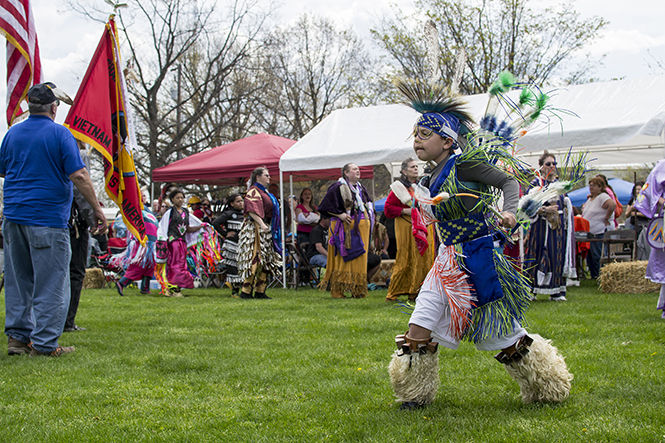NASA hosts annual powwow, celebrates culture
A young boy dances during the Native American Student Association’s annual PowWow on Saturday May 2, 2015.
May 4, 2015
The Native American Student Association (NASA) hosted its annual powwow, welcoming guests with beating drums and chants to celebrate Native American culture at the Performing Arts Green Space on Saturday.
NASA President Chris Lyons said that the organization was solely funded by itself without any university assistance.
At the event, there were vendors selling Native American clothing, jewelry, bows and arrows, as well as a stand to support war veterans, specifically Native American veterans.
The Grand Entry, a gathering of all of the dancers, started at noon. There was a flag song which consisted of American, Native American, military and others to symbolize where everyone came from.
A prayer and a Veteran’s Dance followed. The dance was in dedication of those who have served in the military while guests danced in their memory and support.
NASA’s past adviser Kimberly Kennedy, who is also of Native American heritage, said that NASA has made her look into her roots and has put her more into tune with her culture, speaking about the importance of the powwoww.
“There are few students on-campus who are Native American,” Kennedy said. “They truly feel that they’re minority. Once they hear their drums and the experience of powwow on campus, it brings them closer to their culture. A lot of the times, Native American culture isn’t really acknowledged to a lot of things.”
Lyons, a senior nursing major, said the powwow is served as a teaching tool to others.
“It brings diversity to our university,” Lyons said. “It makes our culture divine. We teach one person and that person teaches two persons, and it goes on from there. It isn’t just for us but for the elders, for the children passing on the stories and the knowledge of what really matters in life: Family, humility, community, those things are important to us.”
NASA Vice President Michael Weisel said he wanted students, who are not of Native American descent, to understand what a powwow is and what it means to Native Americans.
“It is not just this whole stereotype of people getting together just singing and dancing. It’s more than that,” Weisel, a senior sports administration major, said. “It’s the lyrics, the drum beat; everything else represents something. We had three different drums so three different nations are represented. People don’t understand that it is more than singing and dancing. It’s coming together, celebrating our culture, celebrating veterans and also recognizing everybody’s nations.”
Kennedy, Lyons and Weisel all explained how one of the main intentions of this event was to help eliminate the stereotypes of Native American culture.
“I think there is a lot of racism going on which people don’t realize that there are a lot of issues that need to be taken into consideration,” Kennedy said. “It is always an underlying racism and that a lot of people don’t acknowledge. I think that getting the powwow — having it publicized and people attend it — they’ll see people in realize and what it means to them and the importance of the sacredness of it.”
Lyons said that he wants others to appreciate Native American culture more but to also de-stereotype it.
“De-stereotyping those things that you see on television, that’s what we work for,” Lyons said. “We want people to know that we still exist and we exist in the capacity that most don’t realize. We don’t live in teepees. We don’t live in wigwams. We are normal people in everyday life; it’s just we’re still there though.”
Senior biochemistry major Sierra Crotty, who said she is of Native American descent and attended the event, said she believed that the powwow was beneficial for others to learn about different cultures other than their own.
“It is important for everyone to realize that there’s all kinds of different people out there and that just because someone is different from you doesn’t meant that their viewpoints, traditions, cultures, are less valuable than your own,” Crotty said.
To learn more about NASA, visit http://www.kent.edu/csi/native-american-student-association.
Contact Sabrina Scott at [email protected].

























